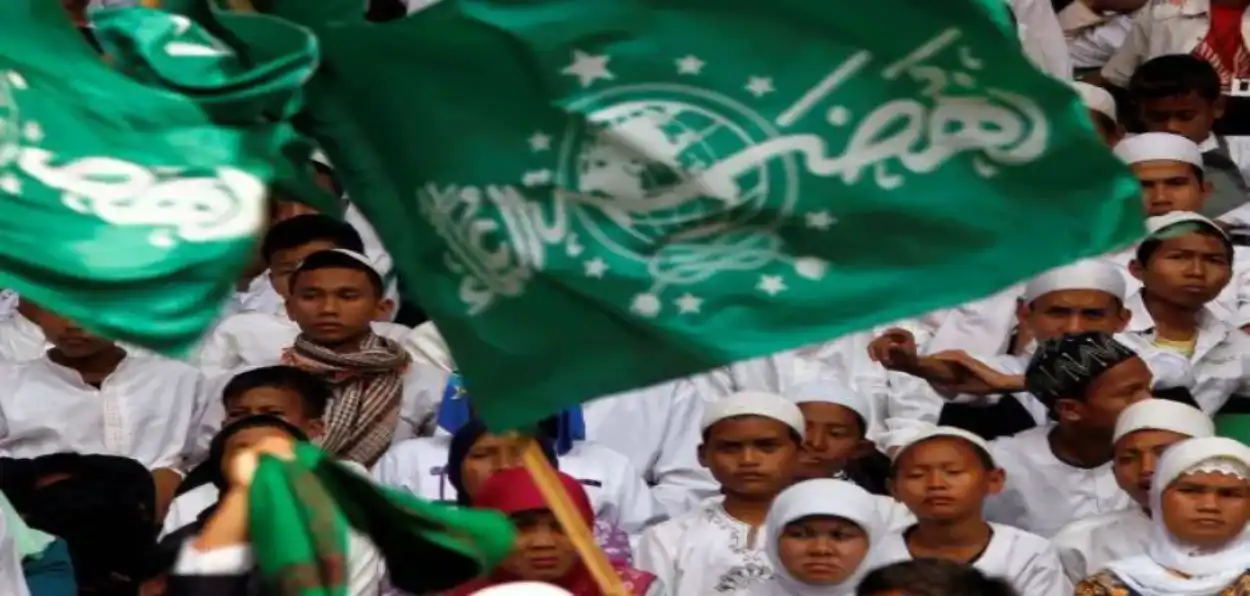
Mansooruddin Faridi
Indonesia is an oasis of peace and co-existence amidst the volatile Muslim countries comprising Pakistan, Afghanistan, Iran, Iraq, Syria, Libya, etc. There is no political conflict, religious war; no culture of hate for others.
Indonesia is much like India is a Republic, with a culture of tolerance and following the unity in diversity dictum and living it with aplomb. For this reason despite the Islamic groups like ISIS and Al Qaeda trying their best to scout for recruits in the world’s largest Muslim country, Islamic radicalism has not taken root there.
Why is it so in a country that has the world’s largest Muslim population?
The Islamic scholars there not only correctly interpreted Islam but also presented a somber face of the religion to its people. The credit for this goes to Nahdlatul Ulama, one of the largest Islamic organizations in the world.
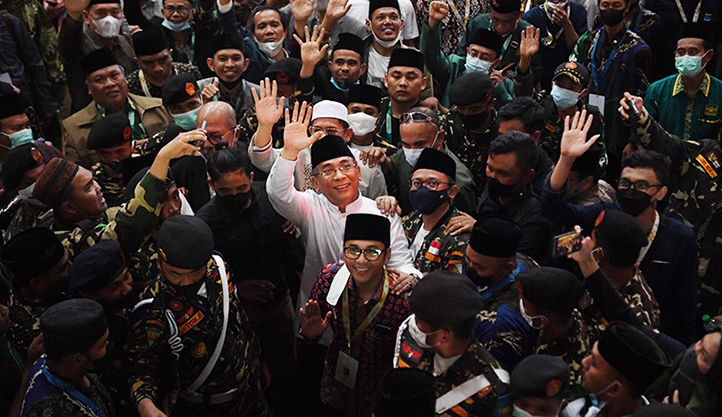 KH. Yahya Cholil Staquf, Chairman of Nahdlatul Ulama, surrounded by supporters
KH. Yahya Cholil Staquf, Chairman of Nahdlatul Ulama, surrounded by supporters
This organization always protected Indonesian Muslims from extremism forces and terrorism. This organization of Sunni Muslims was established on January 31, 1926, in response to an innovative organization, Muhammadiyah.
According to estimates, the organization has 90 million members though it is difficult to estimate the exact numbers.
The organization launched Islamic reforms in 2014 at a time when ISIS and its radical ideology were influencing a lot of youth from Muslim societies across the world.
By taking effective steps, Nahdlatul Ulama served the Muslims of the country and the region from the effects of ISIS. At that time, the organization called these religious reforms "humanitarian Islam".
It is a charitable organization that makes up for the deficits and deficiencies of the Indonesian government by providing financial support to schools, and hospitals and collects and distributes zakat and alms.
This organization wields a considerable influence in Indonesia and in the Islamic world.
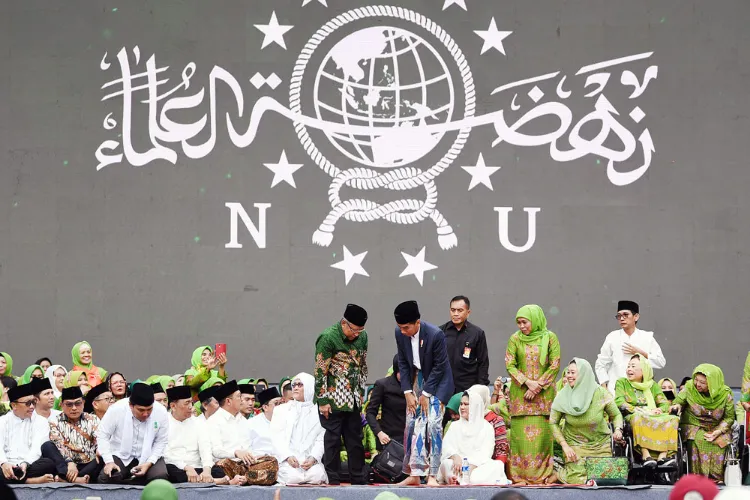
A session of the Nahdlatul Ulama
This religious campaign or movement in Indonesia protected the Muslims of Indonesia from Middle East politics and the torture of Al-Qaeda and Daesh terrorism.
The island country where more than 700 languages are spoken is a repository of cultural wealth and this has been preserved despite Islam taking deep roots.
Geographically, Indonesia is a country consisting of 17,000 islands, with a population of about 260 million. There are about 23 million Muslims in Indonesia, 3 million Christians. Not only this, there is also a large population of Hindus and Buddhists. Never once there was a major incident of communal conflict in the country.
Last year, for the first time in its 100-year history, the world's largest Islamic organization in Indonesia added women to its top leadership, appointing 11 women to its board for five-year terms.
Alisa Wahid was one of the women appointed to the senior role in February. The 48-year-old is the daughter of the late Indonesian president, Abdul Rahman Wahid. In 2017, women members launched Indonesia's First Congress of Women Ulama - which called all political parties in the country to stand up against child marriage.
In the past nine years, the General Secretary of Nahdlatul Ulama Yahya Chol Stakov, has organized several meetings of the organization's Islamic scholars with a reformist agenda. He made public pronouncements to reform Islamic thought on controversial issues including political leadership, equal citizenship, and relations with non-Muslims.
His pronouncements include important rulings that distinguish "humanitarian Islam" from other interpretations. First, the organization rejects the idea of a global Caliphate or political leadership that would unite all Muslims.
The concept of the caliphate has been embraced by mainstream Islamic scholars, such as Al-Azhar—Egypt's world-renowned Islamic institution—and radical groups such as the Islamic State group and al-Qaeda.
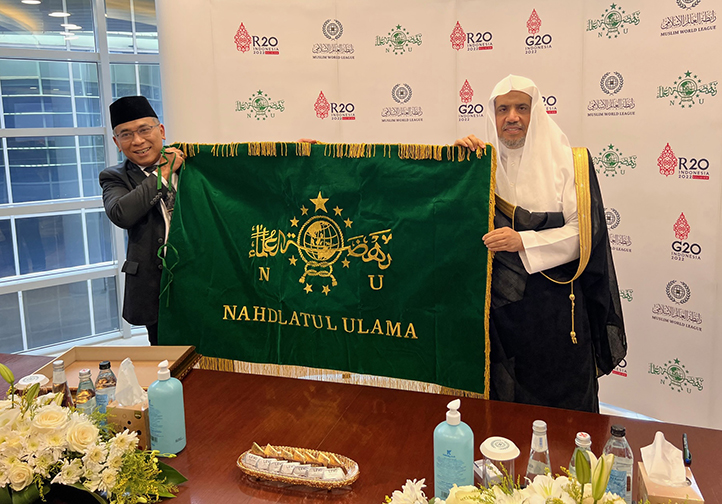 Muslim World League leader with Nadhtlatul Ulama chief
Muslim World League leader with Nadhtlatul Ulama chief
The organization's declarations also emphasize the legitimacy of the constitutional and legal systems of modern states and thus reject the idea that establishing a state based on Islamic law is a religious obligation
Nahdlatul Ulama has become a movement that rejects the distinction between Muslims and non-Muslims as legal categories and emphasizes the importance of equal citizenship as well as deeper cooperation between Muslims, Christians, and followers of other religions to promote world peace.
Nahdlatul Ulama has taken practical steps to achieve its goals and is not just a paper tiger. For example, it has established a working relationship with the World Evangelical Alliance, an apex body of 600 million Protestants, to promote intercultural solidarity and respect.
A study of about 50 Muslim-majority countries, Indonesia was ranked as the best because Indonesia's core belief is Pancasila, which means five principles, which mainly include belief in God, philanthropy, Indonesian national unity, democracy, and social justice and Nahdlatul Ulama and Muhammadiyah too acknowledges and respects this.
Like the Nahdal Ulama, the Muhammadiyah has millions of followers, and the two are often united against radical Islamist groups. Robert Hefner, a leading expert on Indonesia, has documented the role of these two organizations in the democratization of Indonesia in his book Civil Islam. During this process, Nahdal Ulama leader, Abdul Rahman Wahid became Indonesia's first democratically elected president in 1999. Wahid died in 2009 leaving a rich religious legacy.
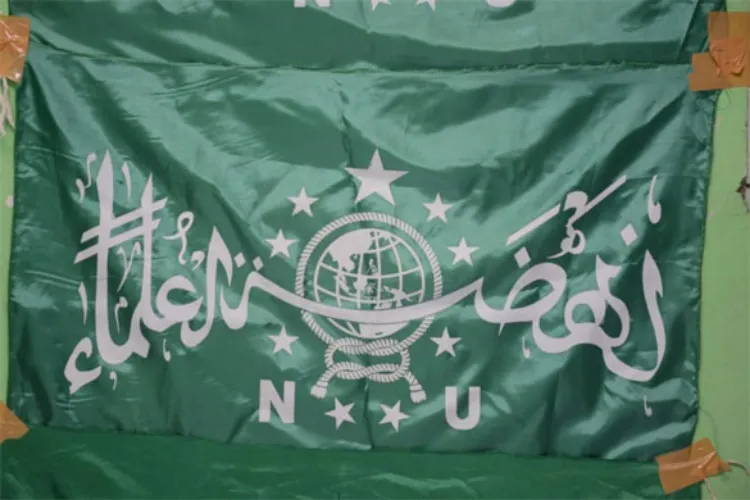
Emblem of Nahdlatul Ulama
There are aberrations too: For Example, the Aceh province has implemented some Islamic criminal laws, including flogging for alcohol sale; Indonesia’s blasphemy law recently resulted in the Chinese Christian governor of the capital Jakarta, Basuki Poornama, being sentenced to 20 months in prison in 2017-2018 for quoting a verse from the Quran.
Also two years ago the story of a Christian student being pressured by her school principal to wear a headscarf went viral on Facebook.
In the last incident, within two weeks, the Indonesian government issued a decree banning religious dress in public schools.
Interestingly, the decree for school dress was signed by the three ministers including the Minister for Religious Affairs, Yakut Chol Qomas, a member of Nahdlatul Ulama.
ALSO READ: Indonesian Muslims celebrate their Hindu-Buddhist past, Hamid Naseem shares experiences
Nahdlatul Ulama is also the co-founder of the G20 Religion Forum (R20) during the Indonesian presidency of the G20. The R20 was established to provide a global platform for religious leaders of member countries to express their concerns and raise voices for common cultural values.Indonesia is an oasis of peace and co-existence amidst the group of volatile Muslim countries comprisings Pakistan, Afghanistan, Iran, Iraq, Syria and Libya, etc. There is no political conflict, religious war; no culture of hate for others.
